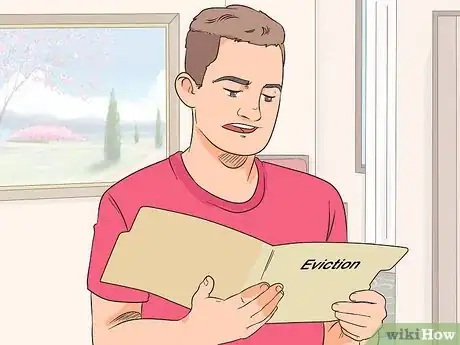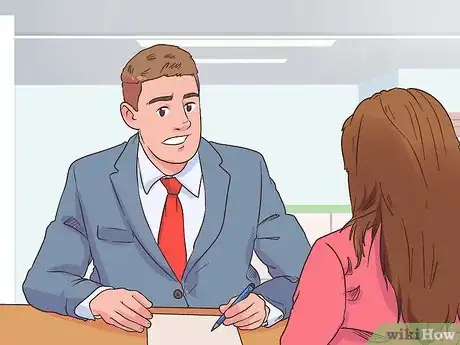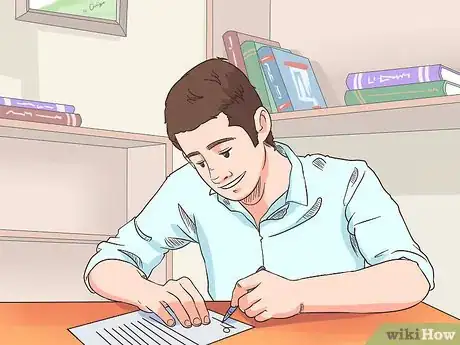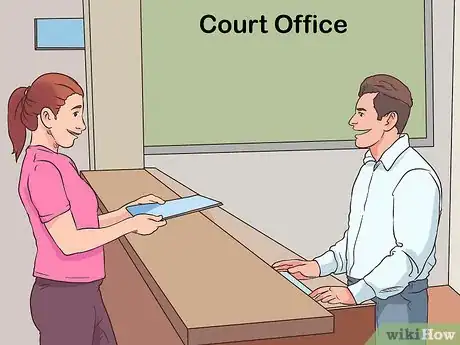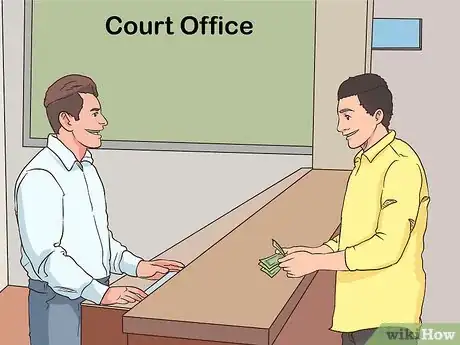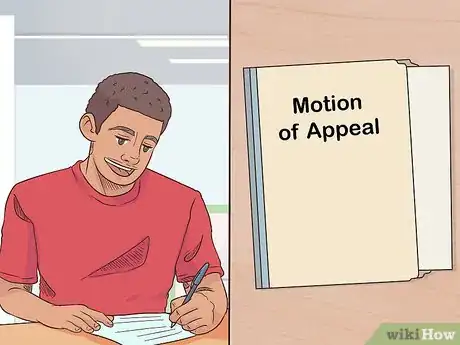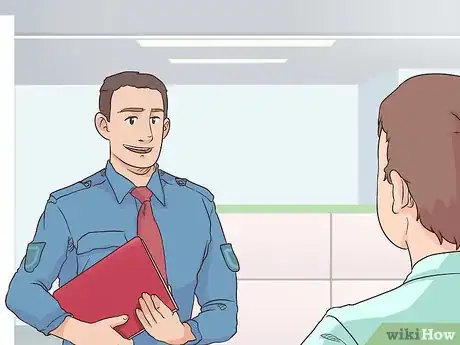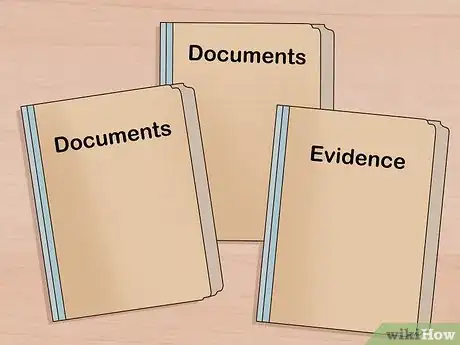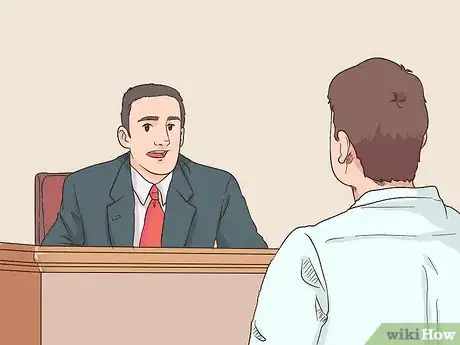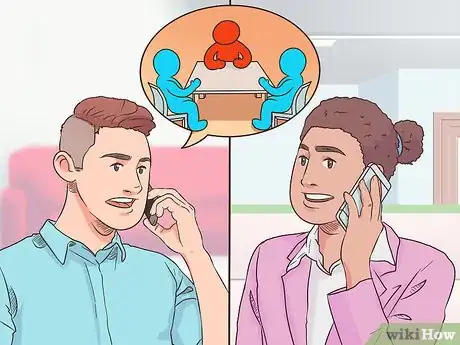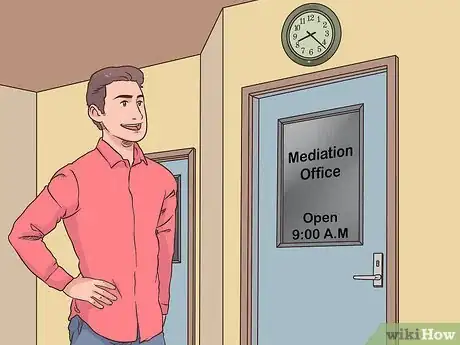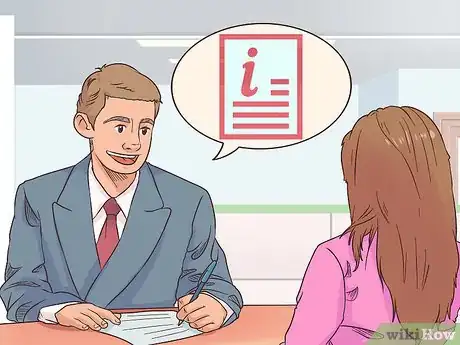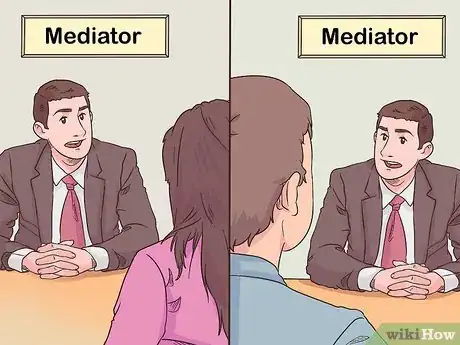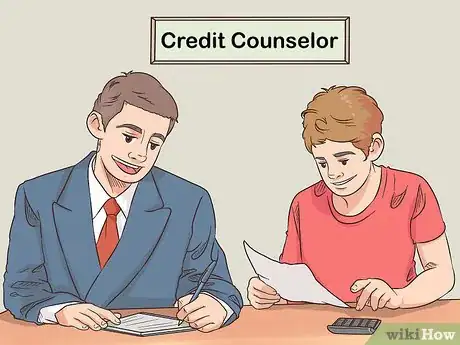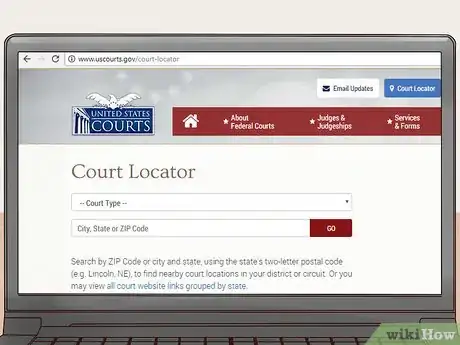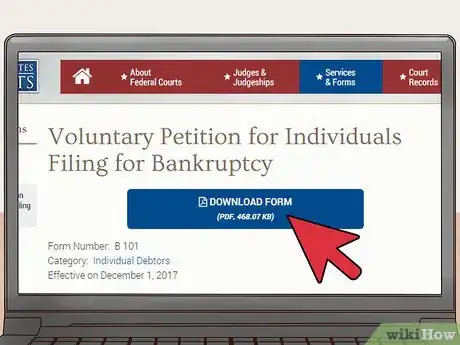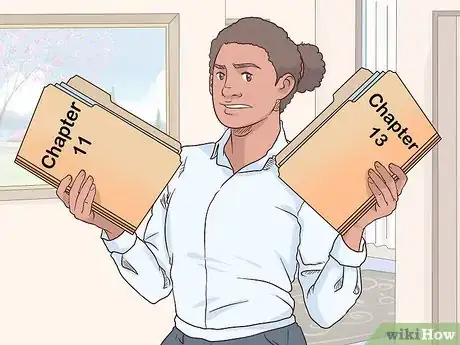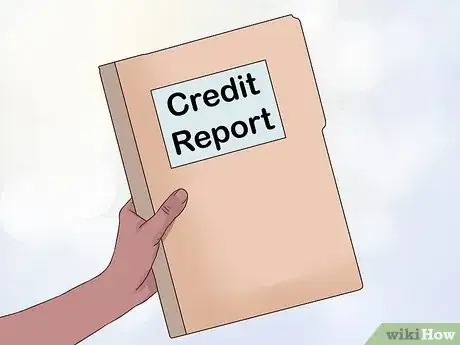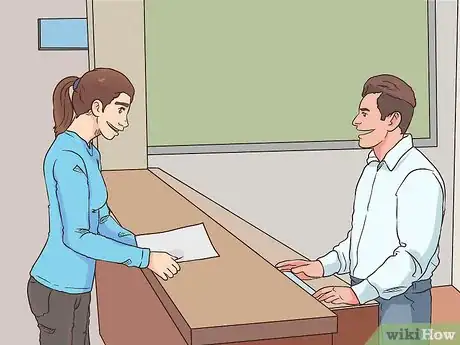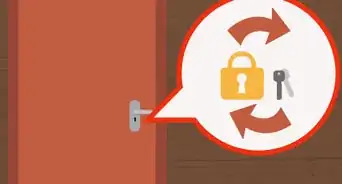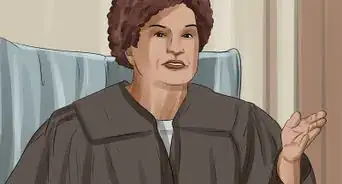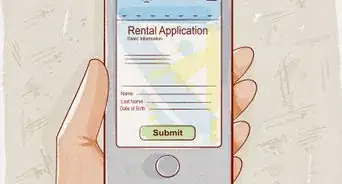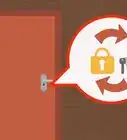This article was written by Jennifer Mueller, JD. Jennifer Mueller is an in-house legal expert at wikiHow. Jennifer reviews, fact-checks, and evaluates wikiHow's legal content to ensure thoroughness and accuracy. She received her JD from Indiana University Maurer School of Law in 2006.
There are 10 references cited in this article, which can be found at the bottom of the page.
This article has been viewed 19,985 times.
If you come home to find an eviction notice taped to your door, you may be frightened, upset, angry, or a little bit of all three. This can be a challenging situation if you live in Florida, which has very landlord-friendly eviction laws. Try not to panic, because you need to take action immediately. You only have 3 days to respond to the eviction complaint, or your landlord may win by default.[1] Keep a clear head and figure out if other options, such as negotiating with your attorney or filing bankruptcy, will work better for your situation.[2]
Steps
Responding to the Complaint
-
1Read the complaint carefully. The complaint tells you why you are being evicted and how much money your landlord claims you owe them. It also lets you know where you need to file your answer.[3]
- The most common reasons a landlord will evict a tenant is for failure to pay the rent or for breaking the terms of the lease. For example, if your lease specifies that no pets will be allowed in your unit, and you have a dog, your landlord might evict you.
- You have 3 days from the date you were served with the complaint. If it was taped to your door, you have 3 days from that date. If the third day falls on a weekend or holiday, you have until Monday or the next non-holiday.
-
2Evaluate your possible defenses. If your landlord didn't follow the proper procedures before evicting you, or if you believe they are evicting you for an illegal reason, you may have a defense to the eviction.[4]
- For example, your landlord may claim they are evicting you for nonpayment of rent. However, you have reason to believe your landlord is evicting you in retaliation for calling the health department to complain about unsafe building conditions.
- If you want to raise a defense to the eviction, you must also follow all legal procedures properly. This means filing an answer within 3 days and depositing your rent with the court.
Advertisement -
3Consult an attorney. When you're served with an eviction complaint, you don't have a lot of time to respond. However, it's still in your best interests to at least talk to an attorney about your possible defenses.
- If your finances are tight, call the Florida Bar Lawyer Referral Service at 1-800-342-8011. Tell the clerk you want a referral to the Low Cost Panel. They'll ask questions about your finances and provide you a referral if you qualify.[5]
- Most lawyers who handle evictions provide a free initial referral, so you can at least use that to get some advice on your case, even if you don't end up hiring an attorney.
-
4Draft your written answer. Your written answer to the eviction complaint is your first official appearance in court. It tells your landlord that you intend to fight the eviction, and lists any defenses you claim apply to your case.[6]
- Florida Legal Services has an online form you can use to create your answer if you're drafting it on your own without the help of an attorney. Go to https://www.floridalawhelp.org/node/248/form-pro-se-eviction-answer to get started.
-
5File your answer. When you've completed your answer, sign it and then make 2 copies. Take your original and your copies to the clerk's office of the court where the complaint was filed. Look at the top of the complaint to find the name of that court.[7]
- The clerk will file your original documents with the court and give the copies back to you. One of the copies is for your own records, while the other will have to be delivered to your landlord.
- When you file your answer, the clerk may set a hearing, known in court as an "unlawful detainer." The hearing typically will be 2 or 3 weeks after the date you file your answer.
-
6Deposit unpaid rent with the court. Florida law requires you to deposit all unpaid rent with the court, as well as any other rent you owe as it becomes due. If you want to fight the eviction, you cannot skip this step.[8]
- If you don't deposit any rent or other fees owed with the court, your landlord will win by default and you will forfeit the right to raise any defenses you may have.
-
7File a motion if you dispute the rent you owe. You do have an option if your landlord is claiming you owe more in rent and fees than you believe you do. You can file a motion with the court to determine the amount you owe your landlord.[9]
- If you file this motion with your answer, you still have to deposit the amount of money that you agree you owe your landlord. Typically this amount cannot be zero.
- The judge may hold a separate hearing on your motion, or they may address it at your eviction hearing. Be prepared to prove that you don't owe as much money as the landlord claims you do. You may have evidence to back up your claim, such as receipts for rent paid.
-
8Have your landlord served. Immediately after you file your answer, you must send it to your landlord or their attorney. You can hire a sheriff's deputy or private process server to serve your answer personally, or you can mail it using certified mail with return receipt requested.[10]
- If your landlord is represented by an attorney, you must send them your answer. Their name and address will be listed on the complaint.
-
9Organize your documents and evidence. You only get one court date, so you should take with you everything you want the judge to consider. What you bring depends on the defenses you're raising and what you want the judge to know.[11]
- For example, if you're arguing that your unit or the building is unsafe, you should take photos of the unsafe conditions to show the judge.
-
10Go to court for your hearing. Show up at the courthouse at least a half hour before the time your hearing is scheduled. This will give you enough time to get through security and find the correct courtroom.[12]
- Dress in clean, conservative clothing, as though you were attending a job interview. When you find the courtroom, take a seat in the gallery until your name is called. Then you can stand and move to the front.
- The judge typically will hear from your landlord first, then you will have the chance to explain why you shouldn't be evicted. At this time, you can present any evidence you have.
- In addition to physical evidence, you can also bring witnesses to testify in your defense. For example, if you're claiming you didn't pay rent due to unsafe conditions, you might bring your neighbors to testify about those conditions.
- If your landlord wins, the judge will issue a judgment for possession. You have 24 hours to move out on your own. After that time, a sheriff can come and padlock the door, forcing you out.
Negotiating with Your Landlord
-
1Request mediation from the court. Florida county courts provide mediation services that you can attempt before having a hearing in front of a judge. Mediation is less intimidating, and you may come to an agreement without having to go to court.[13]
- Mediation is typically free for eviction cases. Some counties may charge a small fee. Because you have a short period of time to respond to the eviction complaint, request mediation as soon as possible after you're served with the complaint.
- Another benefit of mediation is that you would not have an eviction on your record. An eviction judgment can damage your credit and make it more difficult for you to rent in the future.
-
2Organize your documents and evidence. You want to take with you any documents or other information that you want to mention to your landlord during the mediation. You also may want to take notes or outline what you want to say.[14]
- For example, if you think you shouldn't have to pay as much rent because your unit is in disrepair and the landlord hasn't fixed the problems, you might take pictures of the problems in your unit.
- If you disagree with your landlord's interpretation of a provision of the lease, bring your lease along and take notes so you can explain your understanding.
- Mediation proceedings are confidential, so you typically can't bring someone else with you unless your landlord agrees they can come. However, if you need someone to translate, you can bring someone for that purpose. You can also bring an attorney if you have one.
-
3Arrive on time for your mediation appointment. Even though mediation is less formal, you should treat the process with just as much respect. Arrive a few minutes early so you have time to get settled before the mediation begins.[15]
- Dress in clean, conservative clothing, just as you would if you were going to court. You want to make a good impression and signal that you're taking the process seriously.
-
4Listen to the mediator's introduction. The specifics of mediation depend on the individual mediator. Typically, the mediator will begin by introducing themselves and explaining the general procedure they like to follow.[16]
- Following the introduction, the mediator may ask you and your landlord to each briefly explain the issue and what you want out of mediation.
-
5Caucus with the mediator. Most mediators move you and your landlord to separate rooms. The mediator will talk to you privately, then go and talk to the landlord about what you discussed. The mediator only tells the landlord what you agree they should say.[17]
- The landlord will then talk to the mediator, and the mediator will return to you with the landlord's response.
- It is the mediator's job to offer suggestions and help you and your landlord find some mutually agreeable compromise.
-
6Discuss a possible agreement with your landlord. If the mediator senses that you are approaching agreement, they'll typically bring everyone back into the same room to work out the details of the agreement.[18]
- If you're unable to reach an agreement, you still have the opportunity to have a hearing in court.
Filing Bankruptcy
-
1Seek advice from an attorney. While filing for bankruptcy can stop your eviction, there are some circumstances when this won't work. Before you decide to file for bankruptcy, get a legal opinion on whether this is the best option for you.[19]
- You can also file for bankruptcy through an online agency, which may not cost as much as filing through an attorney.
- It is possible to file bankruptcy on your own, without hiring an attorney. However, you will be expected to know the bankruptcy code and court rules just as an attorney would.
-
2Attend a credit counseling session. You must meet with a credit counselor before you are allowed to file for bankruptcy. After this session, the credit counselor will give you a certificate that must be filed with your bankruptcy petition.
- The credit counseling agency must be approved by the Department of Justice. A list of approved agencies is available at http://www.justice.gov/ust/eo/bapcpa/ccde/cc_approved.htm.
- This meeting may take place in person, over the phone, or online.
-
3Identify the court where you should file. Your state may have several bankruptcy courts, each of which has jurisdiction over a particular district. You must file your petition in the court that has jurisdiction over the county where you live.
- You can find out what district you're in by going to http://www.uscourts.gov/court-locator.
-
4Download the correct forms. If you've decided not to hire an attorney, you can download forms from the bankruptcy court's website and file your petition on your own. The court also provides detailed instructions for how to fill out the forms.[20]
- All bankruptcy forms are available at http://www.uscourts.gov/forms/bankruptcy-forms. Generally, if you're an individual, you need all the forms that start with 100. If you're filing bankruptcy with your spouse, use the forms starting with 200.
-
5Decide which chapter you want to file. U.S. bankruptcy law provides several different types of bankruptcy. Chapter 7, liquidation bankruptcy, is most commonly used to stop an eviction. You typically want to choose this chapter if you owe your landlord back rent that you can't pay.
- You can also file Chapter 11, reorganization, or Chapter 13, which is a voluntary repayment plan.
- The form instructions provide eligibility requirements for each of the chapters. Read these carefully or consult an attorney to decide which chapter you want to file under. There may be penalties if you file under one chapter and later change your mind.
-
6Gather financial information. Look over the forms to figure out what financial information you'll need. Generally, you'll need information about all of your debts, assets, income, and living expenses.
- It's a good idea to check your credit report to get accurate information about all of your debts and obligations. You can sign up for a free credit reporting service online to get the information you need so you can file your petition quickly.
-
7Complete your forms. Once you have all the information you need, you're ready to provide the information on your forms. Keep in mind that if you leave anything off your forms, you may not be able to include it in your bankruptcy later.
- You may want to get an attorney's help completing your forms, even if you can't afford to hire an attorney to represent you during the bankruptcy proceedings themselves.
-
8File your forms. Once you file your bankruptcy forms with the court, an automatic stay goes into effect. If your landlord doesn't already have a judgment against you, they usually won't be able to evict you – at least not as quickly.[21]
- Your landlord can file a motion asking the bankruptcy court to lift the automatic stay and allow eviction proceedings to continue. The court would hold a hearing on this.
- If you are being evicted because you used controlled substances on the property, or are otherwise endangering the property, the automatic stay does not apply.[22]
References
- ↑ https://www.nolo.com/legal-encyclopedia/tenant-defenses-eviction-notices-florida.html
- ↑ https://www.floridalawhelp.org/node/185/evictions-what-every-tenant-should-know
- ↑ https://www.floridalawhelp.org/node/185/evictions-what-every-tenant-should-know
- ↑ https://www.floridalawhelp.org/node/185/evictions-what-every-tenant-should-know
- ↑ https://www.floridalawhelp.org/node/248/form-pro-se-eviction-answer
- ↑ https://www.floridalawhelp.org/node/248/form-pro-se-eviction-answer
- ↑ https://www.floridalawhelp.org/node/185/evictions-what-every-tenant-should-know
- ↑ https://www.jaxlegalaid.org/wp-content/uploads/2015/04/eviction-brochure.pdf
- ↑ https://www.floridalawhelp.org/node/185/evictions-what-every-tenant-should-know
- ↑ https://www.floridalawhelp.org/node/185/evictions-what-every-tenant-should-know
- ↑ https://www.floridalawhelp.org/node/185/evictions-what-every-tenant-should-know
- ↑ https://www.floridalawhelp.org/node/185/evictions-what-every-tenant-should-know
- ↑ https://www.jud14.flcourts.org/public-information/alternative-dispute-resolution-mediation/county-mediation
- ↑ http://www.flcourts.org/resources-and-services/alternative-dispute-resolution/mediation.stml
- ↑ http://www.flcourts.org/resources-and-services/alternative-dispute-resolution/mediation.stml
- ↑ https://www.jud14.flcourts.org/public-information/alternative-dispute-resolution-mediation/county-mediation
- ↑ http://www.flcourts.org/resources-and-services/alternative-dispute-resolution/mediation.stml
- ↑ http://www.flcourts.org/resources-and-services/alternative-dispute-resolution/mediation.stml
- ↑ http://www.uscourts.gov/services-forms/bankruptcy/filing-without-attorney
- ↑ http://www.uscourts.gov/services-forms/bankruptcy/filing-without-attorney
- ↑ http://realestate.findlaw.com/landlord-tenant-law/how-a-tenant-bankruptcy-affects-a-landlord-s-right-to-evict.html
- ↑ https://www.law.cornell.edu/uscode/text/11/362
- ↑ https://www.floridalawhelp.org/node/185/evictions-what-every-tenant-should-know
